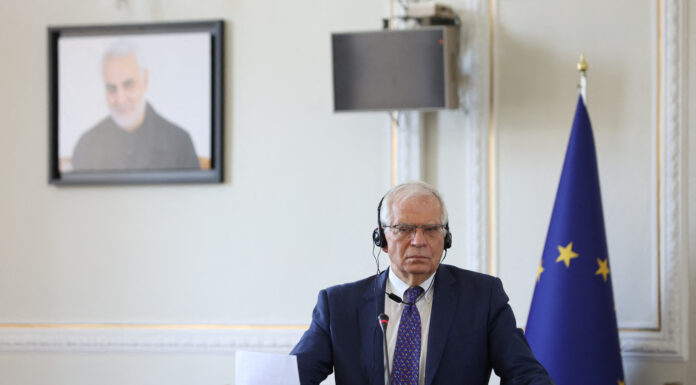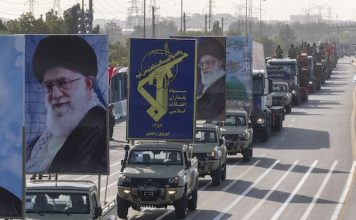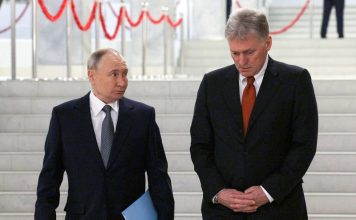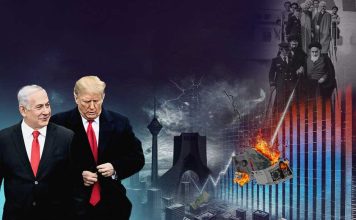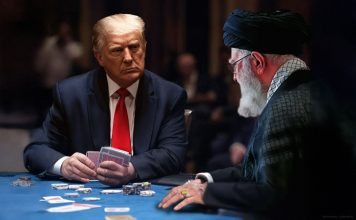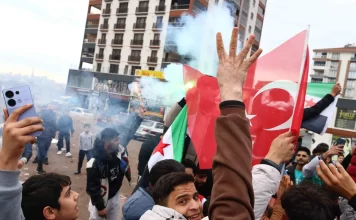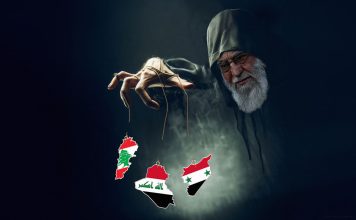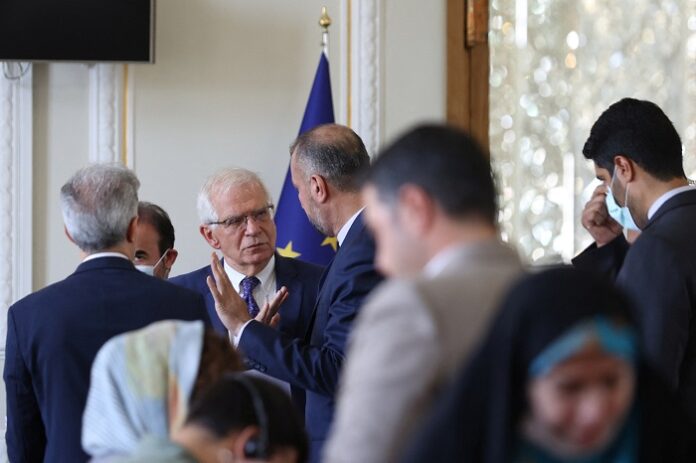
By Ahmad Rafat
Iran must respond by Aug. 15 to the EU’s latest and final proposal on rebooting the 2015 Joint Comprehensive Plan of Action (JCPOA), the Iran nuclear deal.
Brussels is awaiting Iran’s Supreme Leader Ayatollah Ali Khamenei’s response to the draft text to revive the JCPOA, submitted on July 26 by Josep Borrell, High Representative of the European Union for Foreign Affairs and Security Policy.
A European diplomat working for Mr. Borrell’s chief of staff Enrique Mora, who was at the Vienna talks, told Kayhan Life: “Reports from Tehran show that the leader of the Islamic Republic has not made a final decision, but he may give a positive response in the coming hours.”
“We hope the Islamic Republic will not miss the last chance to get on board with the new proposal; otherwise, we will have no choice but to refer the matter to the UN Security Council,” the diplomat warned.
If the nuclear negotiations fail, the EU could invoke the “snapback” provisions of UN Security Council Resolution 2231, which reimpose all UN sanctions on Iran lifted after the 2015 JCPOA.
European countries believe that the only way to prevent an Israeli military attack on Iranian nuclear installations is to reimpose all previous international sanctions on the country in the absence of a new nuclear deal.
Israeli Strikes Hit Iranian Targets Near Russia’s Mediterranean Bases – Sources
However, reimposing sanctions will only delay an Israeli military attack, because it is doubtful that the measure would dissuade Iran from pursuing its nuclear program.
Some experts believe that Iran is only months away from building an atomic bomb, and in that case, it would be impossible for the West and the EU to persuade Israel not to take military action against Iran.
While the Islamic Republic cannot defend its military and nuclear facilities against Israeli attacks, it has other means to respond, including extraterritorial terrorist operations.
In recent weeks European, Western, and Asian security and intelligence agencies have issued warnings about the Islamic Republic and its foreign agents conducting operations under the auspices of the Iranian Intelligence Ministry and the Islamic Revolutionary Guards Corps (IRGC).
ANALYSIS: Iran Is Accused of Leading ‘Campaign of Meddling’ in the West
Terrorism has been a crucial component of the Islamic Republic’s foreign policy in the past four decades. The Islamic Republic has used terrorism as a tactical weapon in its war against the U.S., the West, Israel, and regional countries.
Western and Arab countries have been concerned about Iran’s regional activities and support for paramilitary and militia groups.
The late Lieutenant General Ghasem Soleimani, former commander of the IRGC’s Qods Force (QF), claimed that the Islamic Republic had created “six armies in the Middle East.”
Unfortunately, this is an undeniable fact. A look at what is happening in Syria, Iraq, Lebanon, and Yemen provides confirmation of it.
General Soleimani died in a U.S. drone attack on Baghdad International Airport on Jan. 3, 2020.
Some Iranian officials and European diplomats have been trying to breathe new life into the recent negotiations and remain optimistic about reaching a new nuclear deal.
“European Union diplomats trying to break a deadlock in the talks over an Iran nuclear accord have proposed a significant new concession to Tehran aimed at speedily ending a UN investigation into the Islamic Republic’s past activities,” The Wall Street Journal said on Aug. 11.
The article highlighted two major unresolved issues in the Vienna talks, called “open parentheses.”
The first issue relates to the Iranian demand that the UN nuclear watchdog, the International Atomic Energy Agency (IAEA), close the files on three nuclear sites in Marivan (the western province of Kurdistan), Varamin (the northern province of Tehran), and Turquzabad (Tehran Province).
In March of this year, the IAEA inspector found nuclear material at these sites, which Iran had not disclosed as facilities to conduct nuclear activities. The Islamic Republic has not responded to the IAEA’s questions about traces of enriched uranium found at these facilities.
According to the latest reports, the EU may refrain from referring Iran’s case to the UN Security Council, even if the evidence shows it did not comply with the articles of the nuclear agreement, as long as Tehran cooperates with the IAEA.
The second “open parenthesis” relates to Iran wanting guarantees that the U.S. and the West would ease economic pressures on Iran, including lifting sanctions on the companies and financial institutions close to the IRGC. There are some reports that the U.S. does not object to this demand.
Informed sources say that although U.S. President Joe Biden’s government has not officially agreed to Josep Borrell’s draft text to revive the JCPOA, it does not oppose it and only awaits Iran’s response to the proposal.
Quoting an unnamed Iranian Foreign Ministry official, the Islamic Republic News Agency (IRNA) reported on Aug. 13 that Iran would accept the draft text of the proposal if Tehran received guarantees that its two conditions would be accepted.
In a press conference on Aug. 13, Mikhail Ulyanov, Russia’s envoy to the Iran nuclear talks in Vienna, said the text was “not bad,” adding that it was “a very reasonable compromise.”
According to Mr. Ulyanov, Iran only raised questions about a few words in the text.
“These words can become an obstacle to an agreement, as has happened before in Vienna talks,” the Tehran-based English Language Financial Tribune reported quoting Ulyanov.
The Three Major Issues Bedevilling Talks on Reviving Iran Nuclear Deal
Hamid Hosseini, head of the Iranian Oil, Gas and Petrochemical Products Exporters Union, recently said: “We have reached a point where we have no choice but to strike an agreement. The West believes it has made several concessions to Iran, so Tehran has no excuse for not signing the JCPOA. Also, the EU has made several concessions to Iran in its proposals.”
Some people in Iran oppose the text draft of the new EU proposal, including Hossein Shariatmadari, the managing editor of the Tehran-based hardline Kayhan newspaper and a staunch supporter of Ayatollah Khamenei.
In an editorial published in the Aug. 10 issue of the paper, Mr. Shariatmadari said: “Contrary to reports in Western media, comments by Western officials, by some so-called reformists and members of former [Iranian] governments; the Vienna talks have yielded no results that would guarantee Iranian national interests, especially the country’s economy.”
Nour News online, which has strong ties to Iran’s Supreme National Security Council, said on Aug. 8: “The EU, as the coordinator for the talks, cannot introduce its proposals as a ‘final text’ because the decision is only in the hands of the negotiating parties.”
“No other official can speak of a final text, given the Islamic Republic, as the main party in the talks, does not recognize the text as the final deal,” it added.
While Iran’s Supreme National Security Council leads nuclear negotiations, Ayatollah Khamenei ultimately makes all decisions.
[aesop_image img=”https://kayhanlife.com/wp-content/uploads/2021/11/titre-2-no-335-barjam.jpg” panorama=”off” credit=”Illustration by KL./” align=”center” lightbox=”on” captionsrc=”custom” captionposition=”left” revealfx=”off” overlay_revealfx=”off”]
The Iran newspaper, owned by the Islamic Republic News Agency (IRNA), argued that Tehran should not rush to sign the new agreement and give in to Western pressure, given that it has the advantage in the talks and has time on its side.
“Social, economic and political impacts of global events, including the war in Ukraine, conflict over Taiwan, energy shortage, rising fuel prices and increased demand give Iran the advantage,” The paper said on Aug. 9. “Time is on Iran’s side, given its ability to neutralize sanctions, develop ties outside the Western bloc, increase its nuclear capability and realize its regional defense plans.”
“We will witness the West’s power to wane as Iran’s bargaining power grows in the coming weeks and days,” the paper added.
The deadline by the EU shows it is losing patience with Iran, given that the protracted talks have failed to result in an agreement. It also aims to counter Tehran’s delay tactic and demand a definitive answer.
By kicking the ball back in Iran’s court, the EU is forcing a final resolution to the nuclear talks.

